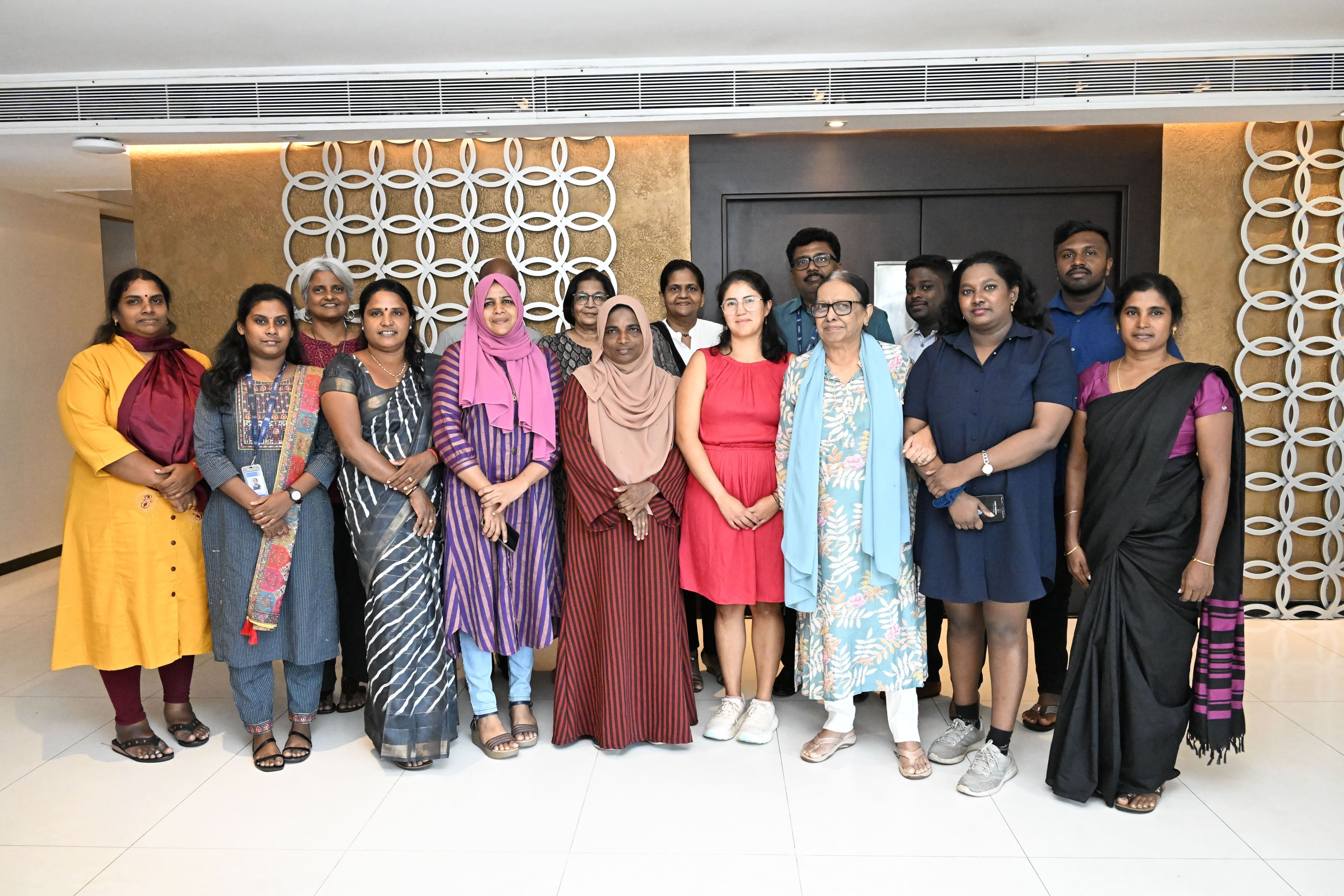RFSU Internal Partner Meeting

Hosted by the Swedish Association for Sexuality Education (RFSU) with support from FPA Sri Lanka, this meeting brought together an incredible network of organizations, including MWRAF, PYEN, JSAC, and FOSDOO from the Northern and Eastern Provinces.
Over the course of the meeting, we celebrated collective achievements, exchanged experiences, and deepened our understanding of the challenges and opportunities ahead. From raising awareness in Jaffna to empowering vulnerable communities in Ampara, Vavuniya and beyond, the discussions were a testament to the impact we’re making together.
Anna Rambe from the Swedish Association for Sexuality Education (RFSU) joined the internal partner meeting via Zoom. In her presentation, she highlighted that 2024 marks 30 years since the landmark Cairo International Conference on Population and Development (ICPD).
The ICPD affirmed that governments must provide universal access to sexual and reproductive health and rights (SRHR) as a fundamental human right. While significant progress has been made in recognizing bodily autonomy and access to services, challenges persist, including legal barriers, discriminatory practices, unequal access, and the impacts of climate change.
Anna emphasized the need to sustain hope and momentum, as SRHR is crucial to achieving sustainable development goals.
As we look forward to the future, the strategies and collaborations forged here will guide us in pushing the boundaries of SRHR even further.
Here is a snapshot of the presentations by each organization.
Jaffna Social Action Center (JSAC)
Their project aim is to raise sexual and reproductive health awareness among 3,000+ people, including students, teachers, parents, youth, and staff in the Jaffna and Nallur areas of the Jaffna District.
Key highlights included forming and strengthening health clubs, conducting training-of-trainers (TOT) for teachers and school management in 10 schools, and working to change attitudes and behaviours regarding adolescents' rights to education, gender, and sexual and reproductive health.
Saritha Irugalbandara from Hashtag Generation presented findings from the research "Online Narratives on SRHR," which analyzed discussions across platforms like Facebook, YouTube, and TikTok. The study explored topics such as pregnancy, contraception, menstruation, abortion, sexual orientation, SRH medical issues, sexual pleasure, and STIs. Pregnancy emerged as the most frequently discussed topic, underscoring its prominence in online SRHR conversations.
The research also revealed that nearly 60% of the content was in Sinhala, with pages, groups, and channels in this language being the primary sources of information. Additionally, a significant amount of hate speech was found targeting the LGBT community.
Sarala Emmanuel presented her research on domestic violence in selected Grama Niladari Divisions and the challenges in implementing the Prevention of Domestic Violence Act in Ampara District. The study provides critical insights into the effectiveness of the Act and the obstacles to protecting vulnerable communities.
Federation of Social Development Organisations (FOSDOO)
The project focused on Sexual and Reproductive Health and Rights (SRHR) among vulnerable groups and government stakeholders in Vavuniya North and Vavuniya. Working partners included frontline officers such as Grama Niladharies, Development Officers, Samurthi Officers, community organizations, and the police, specifically the Child and Women Desk. Activities involved training school teachers on SRHR, conducting awareness programs for students, and youth training sessions.
Outcomes included enhanced SRHR knowledge among FOSDOO staff, who are now contributing to discussions and field operations. Additionally, 52 cases of Sexual and Gender-Based Violence (SGBV) were reported and referred, positive relationships were built with government officers and the community, and gradual changes were observed as the community became more open to discussing SRHR-related issues.
Provincial Youth Empowerment Network (PYEN)
In the first half of 2022, the Provincial Youth Empowerment Network (PYEN) undertook a mapping exercise of Civil Society Organizations (CSOs) in Northern Sri Lanka. The project focused on engaging and enhancing the capacity of CSOs through a range of interventions. These included leading the SRHR working group in the region, coordinating with health, education, and public sectors on SRHR interventions, and networking with both regional and national organizations.
The project also provided technical support to CSOs, focused on SRHR for adolescents and youth, engaged in media monitoring and advocacy, and conducted a lecture series at the University of Jaffna.
Muslim Women's Research and Action Forum (MWRAF)
Their project aimed to improve the quality of life for marginalized women and girls by enhancing access to SRH knowledge and services and addressing gender-based violence through a comprehensive approach that includes awareness-building, education, and support services.
•The project improved menstrual hygiene for marginalized women and girls by providing information, training 10 women to produce biodegradable pads, setting up a production unit, and employing 4 women. It also trained 22 trainers, created educational materials, and raised awareness among 360 schoolgirls and 630 women in Colombo and Ampara districts.
• A study in Ampara District revealed that 47% of 150 surveyed women experienced domestic violence, with 78% of cases perpetrated by husbands, and reviewed the Prevention of Domestic Violence Act.
•Research across three Colombo District locations analyzed child and early marriage trends among Sinhalese, Tamils, and Muslims, using data from 500 women.
• A study in Kurunegala District is examining domestic violence and PDVA implementation, including workshops, awareness sessions for duty bearers, and training for counsellors and youth.
FPA Sri Lanka
In 2023, key achievements included creating an SOP for Sexual and Gender-Based Violence (SGBV) referrals with The WIN, conducting a needs analysis, and providing training on gender, GBV, and SOPs. Educational materials on GBV and domestic violence were also produced. Research by The Hashtag Generation analyzed SRHR online discourses, revealing key insights. Partnering with The Grassrooted Trust, the project advanced menstrual health education, supported reusable sanitary napkin production, and published investigative articles. Additionally, research on the Muslim Marriage and Divorce Act highlighted child marriage prevalence. Government collaborations included training health staff on SGBV response and conducting a CSE workshop for youth.
For 2024, initiatives include training 20 youth fellows on online gender-based violence through a project with Auteur’s Diaries, reforming 10 Disaster Management Committees in Deniyaya with MILKCOOP, and partnering with Publicis Group on a five-year strategy to decriminalize abortion under specific conditions.
.png)


